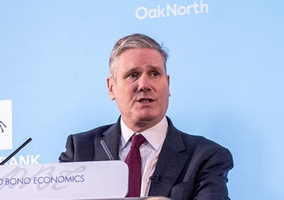As predicted by pollsters throughout the election period, the Labour Party won by a landslide, ending 14 years of Conservative-led government in the UK.
Many in the sector are likely to be excited by the possibility the change in Whitehall could bring, with some charity leaders even leaving their roles to become Labour MPs.
Following a speech in January, charities welcomed Keir Starmer’s pledges to form a “partnership between government and civil society” and to “reset” the relationship between the two as part of his vision for a “society of service”.
His Labour Party made further promises to partner with the sector in its manifesto on issues including the environment, animal welfare and plans for growth, which charities again welcomed.
However, some in the sector pointed out that there was a lack on detail in Labour’s civil society pledges, with some – such as the commitment to return aid spending to 0.7% of gross national income when fiscal circumstances allow – seemingly indistinguishable from the Conservative Party’s policy.
Labour’s former shadow charities minister Lilian Greenwood also towed the party’s frugal public spending line during the election by saying there would not be “tonnes of additional funding” for the sector.
So where does this leave charities desperate for signs of a more positive operating environment, after seeing expenditure spike and donations wither during the cost-of-living crisis?
Private schools
One firm policy Labour announced in the run-up to its campaign was to remove tax breaks for private schools, which they receive due to charitable status, pledging in its manifesto to raise £1.51bn a year in “revenue from applying VAT and business rates to private schools”.
This proposal has drawn criticism from the charity sector, with former NCVO chief executive Stuart Etherington writing that it “fails to appreciate the unintended consequences of this tax change”.
Etherington warned that the policy could lead smaller independent schools to close while those with very rich benefactors would thrive as there are no plans to remove gift aid, inheritance tax or stamp duty land tax reliefs.
“It may even result in some schools weakening the low level of charitable public benefit that they are required to provide, particularly as this goes virtually unpoliced by the regulator,” he wrote.
Richard Sagar, head of policy at Charity Finance Group, previously warned that Labour’s proposal could create a two-tier system of charities, as it would maintain private schools’ charitable status while changing the benefits they receive.
Labour has also pledged to return aid spending to 0.7% of gross national income (GNI) “when fiscal circumstances allow” in its manifesto. This is similar to the Conservative Party’s position and led NGO umbrella body Bond to call for more “concrete details and realistic timelines”.
The Sheila McKechnie Foundation, meanwhile, expressed disappointment that Labour’s manifesto did not refer to anti-protest laws introduced by the Conservatives and against which civil society groups have campaigned.
Partnership
Charity groups most warmly welcomed Labour’s pledges to work in partnership with civil society, although these, like much of its manifesto, are vaguely worded.
As Charity Finance Group deputy chief executive Clare Mills said, “there is little detail on how Labour would work to develop their relationship”.
Umbrella bodies NCVO and ACEVO, whose leaders met the previous government several times during the cost-of-living crisis before it announced £100m for the sector, would like Labour to introduce a charter and engagement strategy for working with civil society.
“The strategy should be underpinned by cross-government collaboration between ministers and officials,” their joint manifesto reads.
“It should outline each department’s responsibility for voluntary sector engagement. It should also include a quarterly forum with the Treasury.”
There are few words on what the charter should look like but it says this “should support charities to work effectively with government”.
Its other requests include a call for the government to create a cabinet role to oversee public service delivery, protect the Charity Commission’s independence, and introduce 0% VAT for charities.
Need to hold Labour to account
It is likely that some voluntary organisations will find the new government less adversarial than members of the previous governing party, with recent research showing that Labour MPs were far less likely than Conservatives to view charities as too political.
But charities must now continue to press the new government to give the sector the greater support, and funding, it requires.
During the election period, it seemed Labour held many of its cards close to its chest and watered down any bolder commitments it feared the Conservatives would latch onto as signs that it would spend public funds irresponsibly.
The election period is now over and the Labour government has the safety net of a sizeable majority, meaning it should be free to show more ambition in its pledges, which could present opportunities for charities to influence policy.
Charities must make sure the new government at least lives up to its partnership pledges in a meaningful way and does not just use the sector to take on the problems it feels are too difficult to solve.
Funding for the sector, including public commissioning, is crucial and charities must continue to protest if there are instances when they are still being asked to prop up the state in the coming years.
Much of the sector is desperate to feel optimistic after some tough years, but charities will need to continue campaigning and holding the government to account if they want it to implement the change they want to see.












